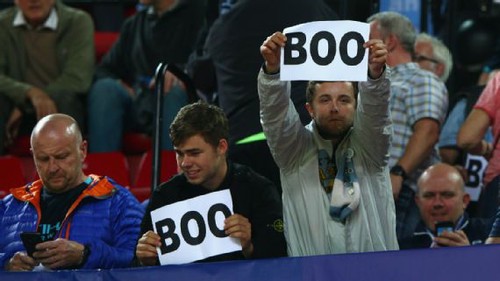
Manchester City may be England's longest-running Champions League representatives (eight consecutive seasons) but the club grabbed another, less impressive record in the dispirited home defeat by Lyon, notching their fourth consecutive defeat in the competition. Three of these have been at the Etihad, just to make it even worse.
No English club had hitherto achieved this particular landmark, underlining City's schizophrenic relationship with the Champions League.
This has raised a number of important questions: Are the players buying into the dream set forward by the owners? Is Pep Guardiola's historical blockage in this tournament a factor weighing on the players' minds and thus a detriment to successful game preparation?
Why the continued supporter-indifference to a competition that City have become increasingly comfortable in? Why the continued antipathy towards UEFA? Why the inward-looking delight whenever it is a question of getting back to the basics of league combat? Why will the fans be buzzing again for the weekend trip to Cardiff, yet seem non-plussed by the arrival of European aristocracy in Manchester?
Let us try to supply one or two answers to a great number of questions.
Firstly, City's support has always leaned heavily towards the bread and butter of league and domestic cup action. Identifying the core support and its characteristics is increasingly difficult given the club's present status, but in a down-to-earth way, this is still sort of what one would expect.
The reintroduction to continental combat after a 30-year absence has taken time to bed in with many supporters. To start with, City's early struggles did not endear Champions League football to the masses. Having already borne witness to literally decades of losing when they should have been winning, something felt slightly uncomfortable watching new, successful City start from scratch again.
Bayern Munich, Napoli, Real Madrid, Ajax, Borussia Dortmund. There were plenty of early lessons to be taken on board. The debacle in Moscow where fans expected some kind of compensation for UEFA's handling of the tie with CSKA (all fans banned owing to CSKA fans' racist behaviour, yet Russian fans sporting colours were let in while City's were turned away) further dampened the spirits and spawned the pre-match booing of the UEFA anthem that can still be heard four years after the incident.
Ask the players in private how they get up for a game with their own fans booing at the start and you may receive some enlightening answers. The smoke-filled delirium of Anfield is probably a bit too much for the down to earth folk of Manchester to contemplate, but there can be little doubt a rousing atmosphere can help create a rousing performance.
This chicken before the egg argument has often been the hot topic in pre and post-match chat among supporters, with some -- quite reasonably -- expecting a team of superstars to be able to rouse themselves on those occasions when the crowd falls quiet. Barcelona and Real Madrid are excellent examples of clubs who do not wait for their large numbers of slumbering supporters to break into song before delivering the coup de grace to a limp opponent.
City's first -- and to date only European trophy -- came in 1970, well before Liverpool's first triumph abroad, yet the attitude to European nights could not be more different. The difference comes from the ensuing 30 years or so, devoid of continental action for one and stuffed with it for the other.
City's 3-1 defeat to Borussia Monchengladbach in 1979 was the last European game played by the club until a fortuitous re-entry via the fair-play places in 2003 and even then City ended up facing not Bayern Munich, not Ajax nor Benfica, but Total Network Solutions. City fans revel in this kind of idiotic quirkiness to the club's history and this too plays a part in how European football is viewed at the Etihad, by supporters, many of whom not only vividly remember the titanic struggles with TNS, but getting knocked out two rounds later in a snow-flecked park by Dyskobolia Grodzisk.
This mistrust of the exotic and warm embracing of the ridiculous plays an important part. Many supporters still struggle to believe their favourites are stepping out at the Nou Camp after seeing them at Chesterfield and Wrexham as recently as 1998.
When it comes down to it, City are just not funny enough anymore. There are few laughs to be had watching the side steamroll Fulham or pen Newcastle back for 83 minutes of a match. As for the players, they know which side their bread is buttered on. The riches, the glamour, the worldwide exposure comes with the Champions League.
The owners grasped this point from the off. This is their target, their mission. For Guardiola too, used to his sides winning then winning some more, his patchy Champions League record remains an irritant.
There is clearly still work to be done and issues to be thought through before City are in the right frame of mind -- both on and off the pitch -- to reach the highest step of club football.
Comments